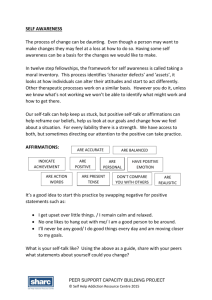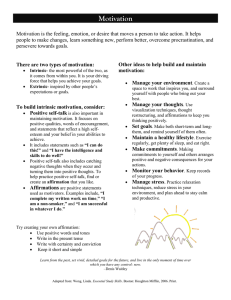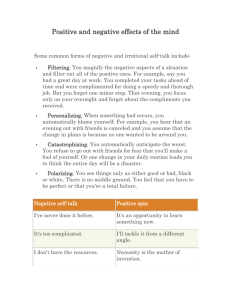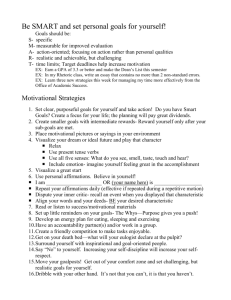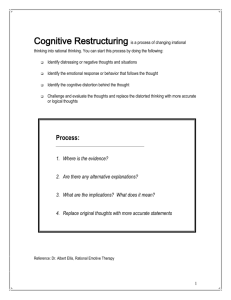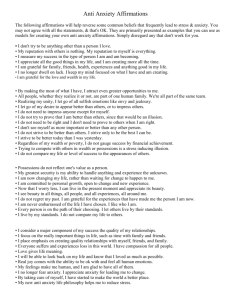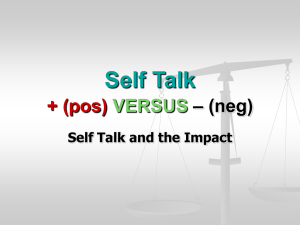Positive Self-Talk
advertisement
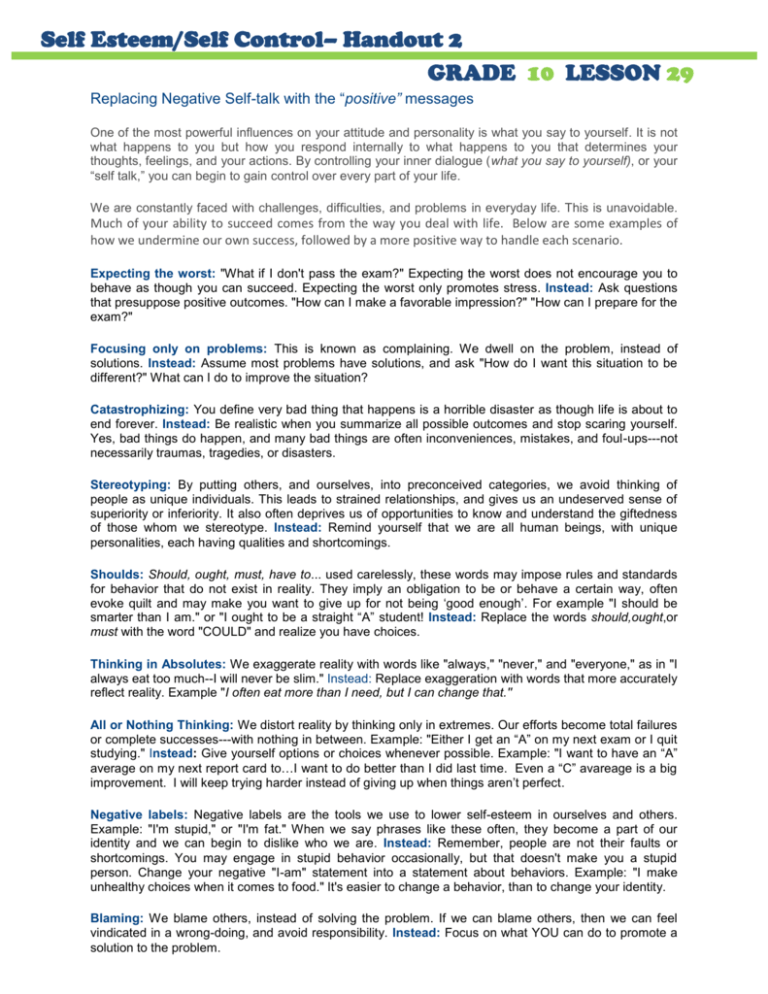
Self Esteem/Self Control– Handout 2 GRADE 10 LESSON 29 Replacing Negative Self-talk with the “positive” messages One of the most powerful influences on your attitude and personality is what you say to yourself. It is not what happens to you but how you respond internally to what happens to you that determines your thoughts, feelings, and your actions. By controlling your inner dialogue (what you say to yourself), or your “self talk,” you can begin to gain control over every part of your life. We are constantly faced with challenges, difficulties, and problems in everyday life. This is unavoidable. Much of your ability to succeed comes from the way you deal with life. Below are some examples of how we undermine our own success, followed by a more positive way to handle each scenario. Expecting the worst: "What if I don't pass the exam?" Expecting the worst does not encourage you to behave as though you can succeed. Expecting the worst only promotes stress. Instead: Ask questions that presuppose positive outcomes. "How can I make a favorable impression?" "How can I prepare for the exam?" Focusing only on problems: This is known as complaining. We dwell on the problem, instead of solutions. Instead: Assume most problems have solutions, and ask "How do I want this situation to be different?" What can I do to improve the situation? Catastrophizing: You define very bad thing that happens is a horrible disaster as though life is about to end forever. Instead: Be realistic when you summarize all possible outcomes and stop scaring yourself. Yes, bad things do happen, and many bad things are often inconveniences, mistakes, and foul-ups---not necessarily traumas, tragedies, or disasters. Stereotyping: By putting others, and ourselves, into preconceived categories, we avoid thinking of people as unique individuals. This leads to strained relationships, and gives us an undeserved sense of superiority or inferiority. It also often deprives us of opportunities to know and understand the giftedness of those whom we stereotype. Instead: Remind yourself that we are all human beings, with unique personalities, each having qualities and shortcomings. Shoulds: Should, ought, must, have to... used carelessly, these words may impose rules and standards for behavior that do not exist in reality. They imply an obligation to be or behave a certain way, often evoke quilt and may make you want to give up for not being ‘good enough’. For example "I should be smarter than I am." or "I ought to be a straight “A” student! Instead: Replace the words should,ought,or must with the word "COULD" and realize you have choices. Thinking in Absolutes: We exaggerate reality with words like "always," "never," and "everyone," as in "I always eat too much--I will never be slim." Instead: Replace exaggeration with words that more accurately reflect reality. Example "I often eat more than I need, but I can change that." All or Nothing Thinking: We distort reality by thinking only in extremes. Our efforts become total failures or complete successes---with nothing in between. Example: "Either I get an “A” on my next exam or I quit studying." Instead: Give yourself options or choices whenever possible. Example: "I want to have an “A” average on my next report card to…I want to do better than I did last time. Even a “C” avareage is a big improvement. I will keep trying harder instead of giving up when things aren’t perfect. Negative labels: Negative labels are the tools we use to lower self-esteem in ourselves and others. Example: "I'm stupid," or "I'm fat." When we say phrases like these often, they become a part of our identity and we can begin to dislike who we are. Instead: Remember, people are not their faults or shortcomings. You may engage in stupid behavior occasionally, but that doesn't make you a stupid person. Change your negative "I-am" statement into a statement about behaviors. Example: "I make unhealthy choices when it comes to food." It's easier to change a behavior, than to change your identity. Blaming: We blame others, instead of solving the problem. If we can blame others, then we can feel vindicated in a wrong-doing, and avoid responsibility. Instead: Focus on what YOU can do to promote a solution to the problem. "Yes but..." Arguments: When someone offers a possible solution to our problems, we "yes but..." and list reasons why the proposed solution won't work. "Yes but..." says "I'm really not listening to you right now." Instead: Open up to new possibilities and consider alternatives. Really listen to advice and give it a fair hearing, before dismissing it so quickly. If you keep trying the same things, you will keep getting the same results. Overgeneralizing: This is similar to stereotyping and thinking in absolutes. It means that we take a single instance or occurrence, and generalize it to numerous other situations. Example: "Joyce is a nice girl, and she doesn't want to date me. Therefore: No nice girl will ever want to date me." When misused, this kind of generalizing can lead to illogical conclusions. Instead: Ask yourself whether there could be exceptions to your generalization. Does a single occurrence mean it will happen every time? Now you know what negative self-talk sounds like. Negative self-talk is usually a mixture of half-truths, poor logic, and distortions of reality that perpetuates negative emotions, such as pessimism, guilt, fear, and anxiety. It often occurs when in times of emotional turmoil, or when we are going through stress or a personal transition. When you catch your negative self-talk, take a deep breath, relax, and remove yourself from the situation. Get up and stretch, or take a walk, or get a drink of water, in order to interrupt your train of thought and get out of the negative rut. Write down some of your negative thoughts and then ask yourself "Are the things I'm saying true? Are there other possibilities and meanings that I could get from these circumstances?" Then replace your negative thoughts with realistic, positive thoughts---and write those down too. Soon you'll stop that self-talk in mid-sentence. If you have difficulty changing your self-talk, you may have clinical depression, and a psychotherapist could help you. Affirmations One way to reprogram your self-talk is by repeating positive affirmations until you begin to get a good sense of what positive thinking really sounds like. What we most often tell ourselves can become a selffulfilling prophecy. If you want to explore the power of positive affirmations, follow these guidelines. 1. Personalize your affirmations with words like "I," "me," and "my." You can't always control 2. 3. 4. 5. 6. circumstances or other people, so make your affirmations about what you can control---yourself. Make your affirmations state your own goals, wants, and values---not someone else's. Affirmations are best stated in the present tense, because, if affirmations are in future tense ("I will...") your subconscious mind feels no urgency to act NOW. If you feel like a hypocrite stating affirmations in the present tense (as in "I am slender and healthy") then state your affirmations as a process (as in "Each day I am becoming more slender and healthier.") Make your affirmations believable and realistic. Begin with small, obtainable goals, and work your way up to bigger accomplishments. "My self control is perfect." is probably more believable as "I have self-control most of the time." State affirmations in the positive. To say "I won’t have a bad report card," only focuses your attention on the behavior you want to avoid. Instead say "My report card will be good." Make affirmations short and easy to remember. Repeat your positive affirmations often and positive thinking will become routine. As you improve your self-talk; commit to changing your actions to reach your goals. We must change our thinking as well as our behaviors.

